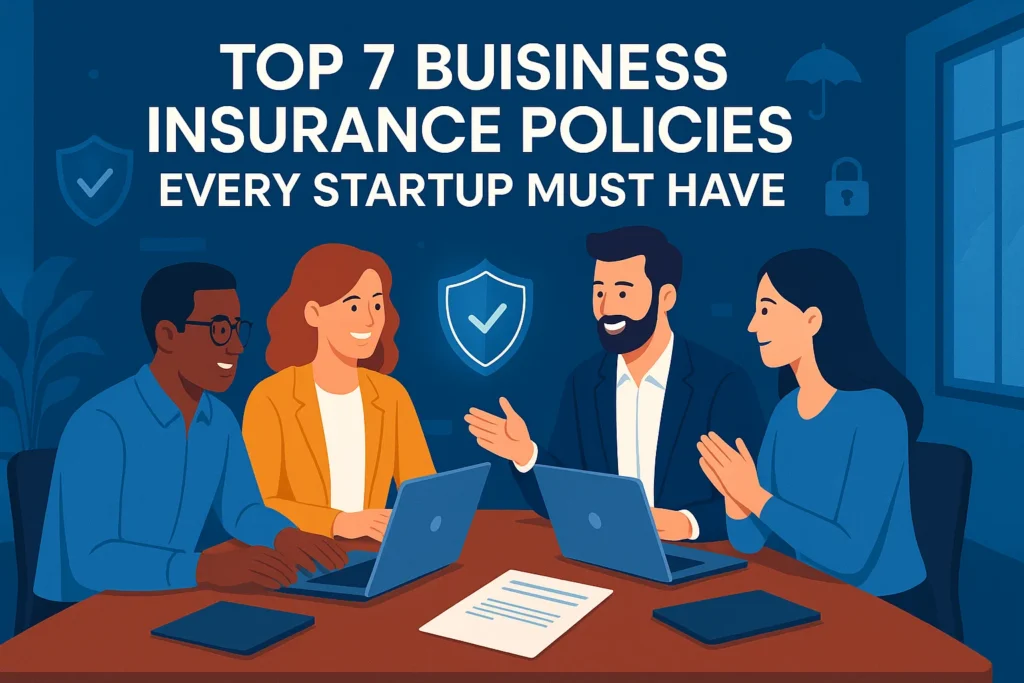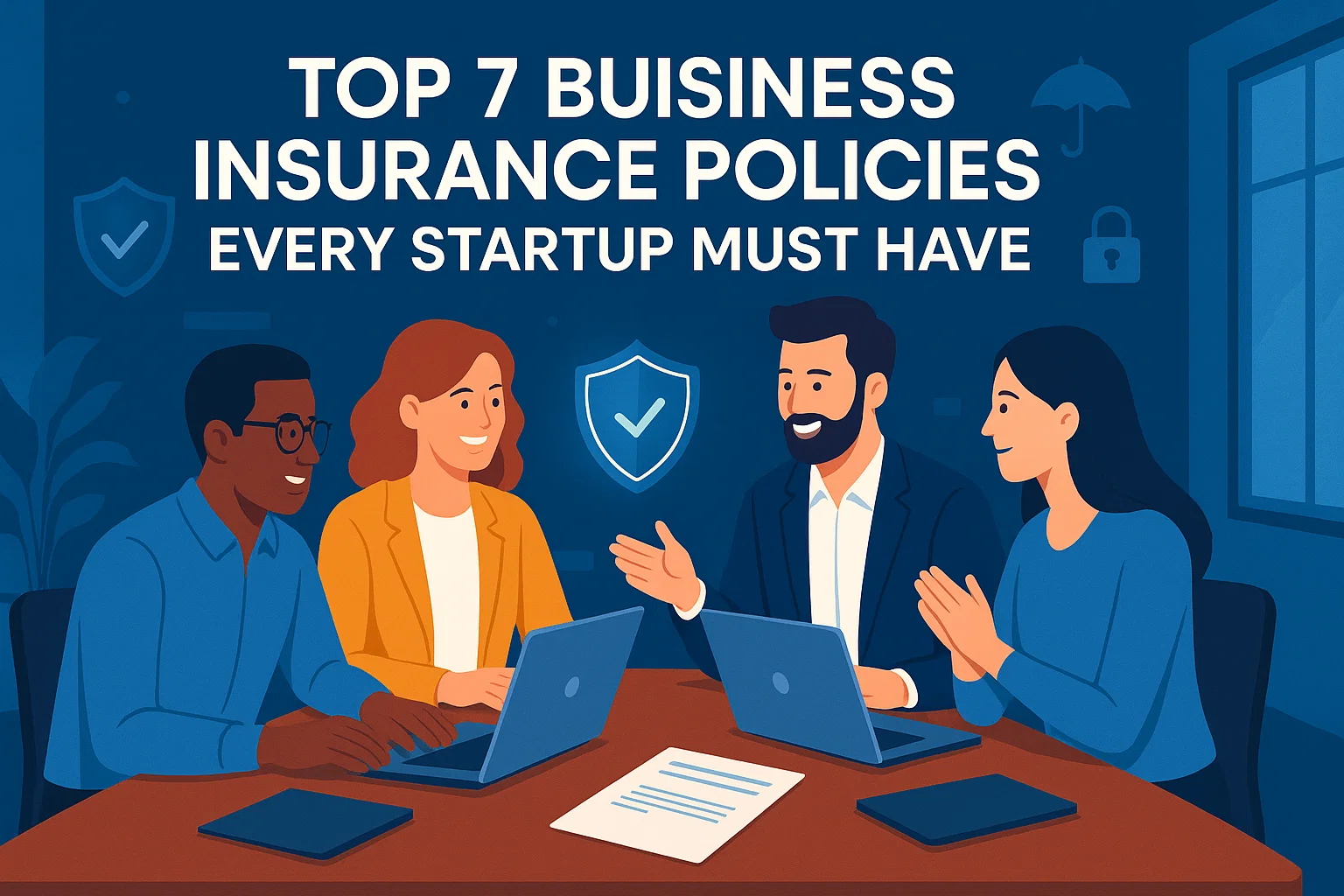
Starting a business is an exhilarating journey filled with opportunities, but it also comes with risks. As a startup founder, safeguarding your business from unforeseen challenges is crucial to ensuring its longevity and success. One of the most effective ways to protect your startup is by investing in the right business insurance policies. These policies act as a safety net, shielding your company from financial losses due to lawsuits, property damage, or unexpected disruptions. In this article, we’ll explore the top 7 business insurance policies every startup must have to thrive in today’s competitive landscape.
Whether you’re running a tech startup, a small retail shop, or a freelance consulting firm, having the right insurance coverage can make or break your business. Let’s dive into the essential policies, their benefits, and why they’re non-negotiable for startups.
Why Business Insurance Is Essential for Startups
Startups operate in a dynamic and often unpredictable environment. From legal liabilities to property damage and employee-related risks, the potential for financial loss is ever-present. According to a 2023 report by the U.S. Small Business Administration, over 50% of small businesses face unexpected disruptions within their first five years, with many failing to recover due to inadequate protection. Business insurance provides peace of mind, allowing entrepreneurs to focus on growth without worrying about catastrophic losses.
Here are the top 7 business insurance policies every startup should consider:
1. General Liability Insurance
What It Covers: General liability insurance is the cornerstone of business protection. It covers claims related to third-party bodily injury, property damage, and advertising injuries (e.g., slander or copyright infringement). For example, if a customer slips and falls at your office or if your marketing campaign accidentally infringes on a competitor’s trademark, this policy can cover legal fees, settlements, and medical costs.
Why Startups Need It: As a startup, you may interact with clients, vendors, or customers regularly. Even a single lawsuit can drain your finances or damage your reputation. General liability insurance is affordable and provides broad coverage, making it a must-have for businesses of all sizes.
Real-World Example: Imagine a client visiting your co-working space trips over a loose cable and fractures their wrist. Without general liability insurance, you could be responsible for their medical bills and potential legal action, costing thousands of dollars.
SEO Keywords: General liability insurance for startups, business liability coverage, protect startup from lawsuits.
2. Professional Liability Insurance
What It Covers: Also known as Errors and Omissions (E&O) insurance, professional liability insurance protects startups that provide services or advice. It covers claims arising from mistakes, negligence, or failure to deliver promised services. For instance, if a client sues your marketing agency for a campaign that didn’t yield results, this policy can cover legal defense costs and settlements.
Why Startups Need It: Startups in consulting, IT, or creative industries are particularly vulnerable to claims of professional negligence. This insurance ensures that a single error doesn’t derail your business financially.
Key Consideration: Professional liability insurance is tailored to your industry. For example, a software development startup may need coverage for coding errors, while a financial consultant may need protection against faulty advice.
SEO Keywords: Professional liability insurance for startups, errors and omissions insurance, E&O coverage.
3. Property Insurance
What It Covers: Property insurance protects your business’s physical assets, such as office equipment, inventory, furniture, and leased or owned property, from risks like fire, theft, or natural disasters. It can also cover the cost of repairs or replacements.
Why Startups Need It: Whether you operate from a home office or a commercial space, your equipment and inventory are critical to your operations. Property insurance ensures that a fire, flood, or burglary doesn’t halt your business. For startups with limited budgets, replacing damaged assets out of pocket can be devastating.
Pro Tip: If you work from home, check if your homeowner’s insurance covers business equipment. In many cases, you’ll need a separate property insurance policy for adequate protection.
SEO Keywords: Business property insurance, commercial property coverage, startup asset protection.
4. Workers’ Compensation Insurance
What It Covers: Workers’ compensation insurance provides benefits to employees who suffer work-related injuries or illnesses. It covers medical expenses, lost wages, and rehabilitation costs. In some cases, it also protects against lawsuits filed by injured employees.
Why Startups Need It: If your startup has employees, workers’ compensation insurance is often legally required in most states. Even if you have a small team, workplace injuries can happen, and this policy protects both your employees and your business from financial strain.
Did You Know? According to the Bureau of Labor Statistics, workplace injuries cost U.S. businesses over $170 billion annually. Workers’ compensation insurance helps mitigate these costs.
SEO Keywords: Workers’ compensation for startups, employee injury insurance, workplace safety coverage.
5. Cyber Liability Insurance
What It Covers: Cyber liability insurance protects against data breaches, cyberattacks, and other digital threats. It covers costs related to data recovery, legal fees, customer notifications, and public relations efforts to restore your reputation.
Why Startups Need It: In 2024, cyberattacks on small businesses surged by 43%, according to a report by Cybersecurity Ventures. Startups, often lacking robust cybersecurity measures, are prime targets for hackers. A single data breach can lead to significant financial losses and loss of customer trust.
Real-World Example: A fintech startup experiences a data breach, exposing customer financial information. Cyber liability insurance can cover the costs of notifying affected customers, providing credit monitoring services, and defending against lawsuits.
SEO Keywords: Cyber liability insurance for startups, data breach protection, cybersecurity for small businesses.
6. Business Interruption Insurance
What It Covers: Business interruption insurance compensates for lost income and operating expenses if your startup is forced to pause operations due to a covered event, such as a fire, natural disaster, or equipment failure. It can also cover temporary relocation costs.
Why Startups Need It: For startups operating on tight budgets, even a brief disruption can lead to significant revenue loss. This policy ensures you can continue paying rent, salaries, and other expenses while your business recovers.
Key Consideration: Business interruption insurance is often bundled with property insurance, so review your policy to ensure adequate coverage.
SEO Keywords: Business interruption insurance, startup financial protection, revenue loss coverage.
7. Directors and Officers (D&O) Insurance
What It Covers: D&O insurance protects the personal assets of your startup’s directors and officers if they’re sued for decisions made on behalf of the company. It covers legal fees, settlements, and other costs related to claims of mismanagement, fraud, or breach of fiduciary duty.
Why Startups Need It: As a startup, you may seek investors or board members to fuel growth. D&O insurance provides confidence to these stakeholders, ensuring their personal assets are protected. It’s also critical if your startup faces lawsuits from shareholders or competitors.
Pro Tip: Even if your startup is small, D&O insurance is a wise investment if you plan to scale or attract external funding.
SEO Keywords: Directors and officers insurance, D&O coverage for startups, leadership liability protection.
How to Choose the Right Insurance for Your Startup
Selecting the right insurance policies depends on your startup’s industry, size, and risk profile. Here are some tips to guide your decision:
- Assess Your Risks: Conduct a thorough risk assessment to identify potential vulnerabilities, such as customer interactions, data handling, or physical assets.
- Consult an Insurance Broker: An experienced broker can tailor policies to your specific needs and budget.
- Bundle Policies: Consider a Business Owner’s Policy (BOP), which combines general liability and property insurance at a lower cost.
- Review Annually: As your startup grows, your insurance needs will evolve. Review your policies annually to ensure adequate coverage.
- Compare Quotes: Shop around for competitive rates from reputable insurers to get the best value.
Common Mistakes Startups Make with Insurance
Startups often overlook or mishandle insurance due to budget constraints or lack of awareness. Avoid these pitfalls:
- Underinsuring: Opting for minimal coverage to save costs can leave your business vulnerable.
- Ignoring Industry-Specific Risks: For example, tech startups need cyber liability insurance, while construction startups may need additional coverage for equipment.
- Assuming Homeowner’s Insurance Covers Business: Home-based startups often mistakenly believe their homeowner’s policy covers business assets.
- Not Updating Policies: Failing to update coverage as your business grows can lead to gaps in protection.
The Cost of Business Insurance for Startups
The cost of business insurance varies based on factors like industry, location, revenue, and coverage limits. According to Insureon, small businesses typically pay:
- General Liability Insurance: $400–$1,500 per year
- Professional Liability Insurance: $500–$2,000 per year
- Workers’ Compensation Insurance: $800–$3,000 per year
- Cyber Liability Insurance: $1,000–$7,500 per year
- Business Interruption Insurance: $500–$2,500 per year
- D&O Insurance: $1,000–$5,000 per year
To manage costs, consider paying premiums annually, bundling policies, or increasing deductibles to lower monthly payments.
Conclusion
Investing in the right business insurance policies is not just a precaution—it’s a strategic move to protect your startup’s future. The top 7 business insurance policies—general liability, professional liability, property, workers’ compensation, cyber liability, business interruption, and D&O insurance—provide comprehensive protection against the most common risks startups face. By understanding your needs, consulting experts, and reviewing your coverage regularly, you can safeguard your business and focus on what matters most: growth and innovation.
Don’t let an unexpected setback derail your entrepreneurial dreams. Get the right insurance coverage today and build a resilient startup ready to tackle any challenge.
Call to Action: Ready to protect your startup? Contact a trusted insurance provider or broker to get personalized quotes and start building your safety net today!
SEO Keywords: Business insurance for startups, essential insurance policies for small businesses, startup risk management, affordable business insurance.

Professional finance Platform. Here we will only provide you with interesting content that you will enjoy very much. We are committed to providing you the best of finance, with a focus on reliability and 1. E-commerce Websites Purpose: Selling products or services online.

